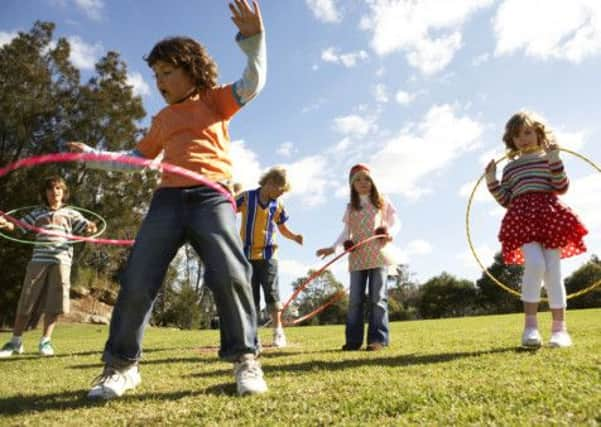Put the risks in perspective and let children play outside


Most evenings my nephew plays with his best friend. They live five miles away from each other, but it doesn’t matter. They each have an X-Box and a headset and if it were up to him he would only venture outdoors on very special occasions.
In the 1970s and 1980s when the current generation of parents were children, they enjoyed more than two hours of outside play each weekday, and a further nine hours at weekends, whatever the weather.
Advertisement
Hide AdAdvertisement
Hide AdBut today’s youngsters venture outside for just over an hour each weekday and less than five hours on Saturdays and Sundays.
The Fresh Air campaign, which is supported by Play England, aims to increase the time children throughout the UK spend playing outside through highlighting the issue and even organising a children’s mock protest demanding more outdoor play.
“Youngsters aren’t playing outside as much as they were,” says Play England’s director Cath Prisk. “But if they’ve only ever sat in front of the telly, played on the computer, then that’s what they’ll want to do.
“If they’re told to go outside and there are regularly lots of friends out there, in a place where they feel safe, they’ll be out every night and all weekend.”
Advertisement
Hide AdAdvertisement
Hide AdThe poll commissioned by JCB Kids of 2,000 parents found that 44 per wished their children played outdoors mores, with a third admitting that even the lightest spot of rain was enough to send them scurrying indoors.
“One of the big differences nowadays is that there’s so much more stuff to do inside and it’s so controlled,” says Prisk. “But kids need time outside, with things to play with that aren’t single-sided – with sticks, leaves, sand, mud and space to chalk in and build in, the world is your imagination.”
Many parents are afraid to let their children play outside because of the perceived risks from traffic and strangers, and while Prisk says she understands their fears, she warns: “Think about the risks inside – what are the implications for a child’s mental health, their ability to make friends locally, and their physical activity levels?”
She says traffic, other possible dangers outside, and the fact that there’s much more to do indoors than there was in the past, all combine to make children play out less. And yet research by the Policy Studies Institute found that in 1971, about 50 per cent of seven-year-olds travelled to local places other than school by themselves, compared to 20 per cent in 1990, and just 10 per cent three years ago.
Advertisement
Hide AdAdvertisement
Hide AdSimilarly, in 1971, 86 per cent of primary school children were allowed to travel home from school alone. By 1990, this had dropped to 35 per cent, and to 25 per cent in 2010.
Prisk points out that children used to get much more time to play during the school day than they do today – and yet 43 per cent of the parents in the JCB Kids survey said they relied on school to ensure their children got plenty of time outdoors through PE and playtimes.
To help tackle the problem, Play England wants parents to “reclaim the streets” for their kids, by thinking about how they played in the street as a child, and what could be possible where they live.
That might involve assessing whether a nearby car park could sometimes be used for children to play in safely, whether they could play in a cul-de-sac, or if there’s green space nearby that could be used.
Advertisement
Hide AdAdvertisement
Hide AdPrisk asks: “It’s not just about kids playing out in their own back garden, it’s about retaking our own neighbourhoods.”
In areas such as Hackney, Bristol and Oxford, residents are being allowed to regularly close their streets to traffic so children can play out. Prisk points out that this year’s UK-wide Playday in August, which is supported by Play England and its sister organisations in Wales, Scotland and Northern Ireland, is urging parents, communities and local officials to consider areas where children can play, whether that’s a street, park or disused green space.
“We want everyone to think about how we can make our places more playful,” explains Prisk. “If kids aren’t outside digging their toes into mud and making daisy chains, and loving their own environment, who’s going to be the next Chris Packham and Sir David Attenborough?
“How will children develop that love of the environment so they’ll campaign for it? They need to play out now. If kids can play out with people they know in a familiar place, it’s just so good for them. They’re happier, healthier, and they’re having fun.
“We’ve got to reclaim our streets to give them that opportunity.”